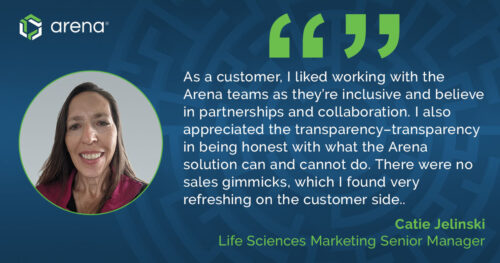Inside Arena With Catie Jelinski: Spotlight on Quality, PLM, and Patient Care
 There’s no doubting the pandemic is driving disruption and innovation. Many industries have been forced to adapt or face disaster. One industry especially, life sciences, is undergoing significant transformation. New approaches that were used to speed up the development of COVID-19 vaccines and healthcare products are now being applied to other products.
There’s no doubting the pandemic is driving disruption and innovation. Many industries have been forced to adapt or face disaster. One industry especially, life sciences, is undergoing significant transformation. New approaches that were used to speed up the development of COVID-19 vaccines and healthcare products are now being applied to other products.
Life sciences companies are discovering the advantage of accelerating their value chain by focusing on solutions for quality and compliance. Solutions like cloud product lifecycle management (PLM) and quality management system (QMS) software are making it easier for better team collaboration, compliance-ready processes, and the ability to deliver products to market faster.
We invited a previous Arena customer, Catie Jelinski, now Life Sciences Marketing Senior Manager for Arena, to share some insights about her life sciences background. Through her observations and on-the-job experience, Catie talks about how PLM/QMS can help companies get to market faster along with what it takes to survive in a competitive market.
Joe: Catie, tell us a little about your experience in life sciences. Is your academic background in the life sciences?
Catie: I’m often asked if I have an engineering degree as that is common in the quality world. I am not an engineer; I have a degree in English from the University of Minnesota. My analytical mindset is not the same as an engineer; however, my approach complements how engineers look at issues and solutions.
I started my career as a proofreader, then did some marketing writing before working as a business analyst writing requirements. Those roles were writing-centric, so it was a natural move to become a technical writer and work on instructions for use (IFUs) at a medical diagnostic company. From there, my career expanded into Quality and process improvement. It was an easy transition as quality records need to be written well.
Joe: How did you get started on a career path that involved PLM/QMS?
Catie: Technical writing was great, but I wanted to expand my career so I moved into the document control world. I was introduced to configuration management and product lifecycle in that role. When I was working as the business process owner for a PLM system, I was fortunate to be included in a configuration management course. The classes centered on requirements and how PLM makes a difference in product manufacturing and quality. The classes were a good fit for me and I was hooked. I’m passionate about patient safety and know that having the right tool can make a difference in how quickly issues can be resolved.
Joe: You used to be an Arena customer and now you’re an Arena employee. What was your experience as an Arena customer?
Catie: We had Arena at one of our facilities. I liked the clean look, how easy it was to use and configure to our processes, and the ease with which we could retrieve records. Changes could be done quickly and we always knew where in the process we were and who was left to review or approve.
Joe: What prompted you to work at Arena?
Catie: As a customer, I liked working with the Arena teams as they’re inclusive and believe in partnerships and collaboration. I also appreciated the transparency–transparency in being honest with what the Arena solution can and cannot do. There were no sales gimmicks, which I found very refreshing on the customer side.
Joe: What makes Arena ideal for life sciences?
Catie: In the Quality world, we often refer to a closed-loop process. In the case of Arena, the system is a closed-loop system in that the QMS is tied back to a product record via the PLM. That’s huge when you’re looking for efficiencies and trying to correct issues quickly. Arena ensures there’s a single source of truth, so users know where to go to get the information. Speed in finding records is important when there are audits and inspections.
Joe: How do companies know they need a PLM/QMS solution? What are some key indicators a company needs a PLM/QMS?
Catie: If someone is using paper-based processes or a homegrown system, it may be time to look at a cloud solution. People will say, “we’ve always done it that way,” so, getting that cultural change is extremely important as people are not always receptive to change. If you have multiple legacy systems with no integration or if your processes are lacking in maturity, it may be time to bring in a solution. Also, if a company gets an audit finding, or a 483 or a warning letter, , that’s sometimes the first indication that they need an electronic system.
Joe: What advice do you have for companies looking into a QMS?
Catie: Many companies expect that implementing a QMS will fix all their issues. A solution, such as Arena, will help with efficiency, but you must work internally to change your culture. Cultural change management ensures that users understand “what’s in it for them” to adapt to the changes a new system will bring. Another key point that’s often overlooked is the budget you set for the solution. You will want to ensure that budget is not the only criteria when selecting your vendor. The vendor relationship is vital when selecting a QMS because implementation will not be successful without that partnership. The Arena partnership was top-notch and second to none.
Joe: As a previous customer, what do you like about Arena’s solution compared to other PLM/QMS software?
Catie: Arena is highly configurable, and administrators can make changes without coding or scripting. This means that the company can make changes rapidly and validation can be conducted quickly. The quality solution integrated with product records is a big differentiator. On top of that, supplier collaboration ensures the changes that impact a supplier can be completed on time with the right level of review.
Joe: Why should companies use Arena?
Catie: Arena can help companies attain operational efficiencies while maintaining regulatory obligations. Quality processes that are efficient and easy to track, ensure that identified issues are resolved in a timely manner. This means less impact on manufacturing, but more importantly, it means the focus is on patient safety. Arena is also easy to use, implementation is straightforward with no need for third-party consultants, and validation is a breeze.
Joe: What are the key capabilities of a PLM/QMS solution that life sciences or other regulated companies should be looking at?
Catie: Meeting regulatory requirements so that risk is reduced is always important and you’ll get that with a solution like Arena. Another great thing a properly implemented solution can provide is going from a reactive mode to a proactive way of working. Of course, this means that there needs to be one way of working so there’s consistency, tracking, and trending that’s standardized. This is important for audits/inspections and management reviews. And finally, a closed-loop system that ties back to the product record so that functional teams in quality, regulatory, R&D, operations, supply chain, and finance are working from that single source of truth.
Joe: What does the future hold for PLM/QMS?
Catie: I think artificial intelligence (AI) is going to take a bigger role in PLM/QMS. It’s already in play, but there needs to be a balance with how it’s implemented as humans must still make a risk-based decision on how to approach an issue.
Joe: What excites you most about working at Arena?
Catie: The people. It’s amazing how inclusive everyone is, a true team. And, of course, the product—it’s easy to configure. You can configure it within weeks whereas other solutions take months. When I was interviewing, it was nice to hear that Arena very much remembers that there is a patient at the end of what we do in the life sciences sector. That’s important to me as a Quality professional. Arena cares!
Joe: Thank you for sharing your experiences as a quality professional and as an Arena customer. We’re happy to have you on the team.
Rethinking what lies ahead for life sciences
While the pandemic was in a state of flux the discovery of vaccines, the collaboration between scientists, governments, healthcare systems, regulators, and the dedication and ingenuity of the life sciences industry rose to the forefront. As for challenges that lie ahead of the life sciences sector, there are many such as continued supply chain shortages, meeting growing compliance requirements, and quickly delivering safe and effective products.
Let Arena help with your regulatory compliance and QMS
At Arena, one thing is for sure, and that’s the need and advantage of bringing on experienced team members like Catie who’ve been in the customer’s shoes. She not only understands the matter at hand but also recognizes there’s a patient at the end of the whole product lifecycle that needs care and wellness. It’s another way Arena is helping life sciences companies address their unique challenges.
Learn more about Arena’s product-centric QMS.
Stay tuned for more Arena employee spotlight stories where Arena team members share their knowledge of being a customer to provide a better solution and overall customer experience.



